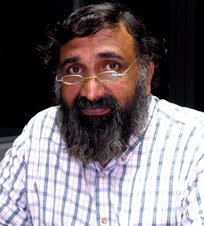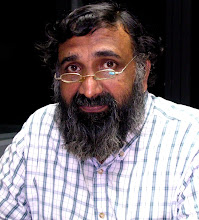These are just some thoughts that came to my mind on reading the new draft policy on ICT and Education of the Government of India.
1. Our education system attempts to provide the same kind of education throughout the country through institutions such as the CBSE and ICSE, while, in the states, every child studies the same material irrespective of his/her immediate society. Thus, a tribal child studies the same things as the urban child and a fisherman's child. While this is certainly desirable to a certain extent, the child acquires few skills needed to live in its surroundings and can get easily alienated from its immediate society. In fact, the curricula is biased towards the needs of the urban child, thus even alienating the rural child from the school curriculum. This is an issue that has occasionally been discussed by our education experts. To an extent, it has been rather difficult to tailor the curriculum to suit the needs of the children in different parts of the country.
Now ICT provides a means of providing appropriate curricula to children in each corner of the country. While there has to be a common curriculum for the entire country, a part can be common just to each state and another part can be customised for each part of the state. For example, while there can be a common curriculum in, say, English, Science and Mathematics for the whole country, the local language varies from state to state, history should have a certain amount of local content (say, 20%), and there can be some material of local relevance in each region (say, 5% overall) apart from history that may be decided in consultation with local people. With ICT, it is possible to plan, create and deliver such diverse curricula and evaluate the students on their achievements too without much difficulty. The national policy should have such goals as its ultimate targets.
2. Any education system is naturally aimed at the average student. As a result, students who have much lower learning abilities and those who are exceptionally brilliant suffer. Students who find it difficult to cope with the curriculum are often helped by providing separate, and sometimes personalised, tuitions. But exceptionally bright students often suffer boredom, eventually lose interest in studies and perform badly in their examinations. This is particularly sad because society loses its brightest brains. Perhaps, this is one of the reasons for India not producing as many outstanding scholars and innovators as it should have considering the high number of scientists and researchers it is producing.
Here again, ICT can provide a way out by offering students opportunities to explore the subjects beyond what their curricula demand, thus satisfying the needs of the exceptionally bright children. By providing a way for them to satisfy their curiosity and explore avenues for knowledge beyond their text books, their minds are kept busy and free of ennui, and they feel a sense of achievement that could drive them to achieve more. With the help of ICT, all this can be done and even the evaluation process can be personalised, providing a "flat" playing ground for all students and making them most useful for society.
3. Another area where ICT should be roped in is in helping children with learning and physical disabilities. Conditions like Dyslexia and Autism are supposed to affect 5 to 10 percent of children in any population. As a nation, we have not been paying much attention to the needs of such children. ICT can be of help in the education of such children. Interestingly, there are people in India who have been working to develop this technology for the education of people with such disabilities. A large fraction of our people, including school teachers, is still unaware of such conditions and tend to punish the children for not performing well. This is a tragedy. They are individuals who can contribute much to society, as much or more than other "normal" individuals. It is time for the Government of India, and the governments in the states, to start paying attention to such issues, educating teachers and parents about learning disabilities and educating them on how to handle such children.
Similarly, ICT can help children with physical disabilities (including blindness and malformed or absence of hands) to lead a more normal life and learn like other students. Again, pieces of Free Software such as Orca (screen reader) are extremely useful not only because they are available free of cost but also they allow us to customise them for the number of different languages and dialects in the country. The proprietary equivalents are not only extremely expensive but also do not allow customisation for our languages. It is time that the Ministry for Human Resource Development looked into these matters and adopted a policy that will be of relevance to them.
Monday, April 11, 2011
Subscribe to:
Post Comments (Atom)


No comments:
Post a Comment